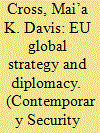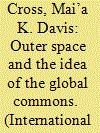| Srl | Item |
| 1 |
ID:
148301


|
|
|
|
|
| Summary/Abstract |
The new EU Global Strategy has significant implications for EU diplomacy, in terms of both goals and means. This article first analyses the timing of the strategy as an exercise in diplomacy in its own right. Second, it argues that the strategy outlines a more expansive and noticeably more smart power-oriented approach to diplomacy in practical terms. Finally, it notes that the strategy has a new meta-narrative for EU diplomacy, which seeks to project a blend of both realistic assessment and idealistic aspiration.
|
|
|
|
|
|
|
|
|
|
|
|
|
|
|
|
| 2 |
ID:
181167


|
|
|
|
|
| Summary/Abstract |
Drawing upon fresh archival research and participant observation, the author traces the emergence and transformative idea of the non-weaponized and peaceful use of space from the 1920s to today. Building on this, the case study questions much of the common wisdom surrounding humans’ relationship with space over the past century. Although the beginnings of the Space Age are usually thought to have closely coincided with the Space Race beginning in 1955, the paper goes further back to the Spaceflight Movement of the 1920s and 30s, tracing the emergence of the idea of space as part of the global commons. This societal-level movement was highly transnational and collaborative in nature, and pushed for the achievement of human spaceflight decades before the technology existed, at the same time advocating for space as a peaceful domain for all of humankind. Using a new approach that also provides the basic ontological assumption for Model 3 of the special issue framework, the author argues that the impetus to engage in space exploration was fundamentally ‘ultrasocial’, defined as a human predisposition to be other-regarding, empathic, and inclined toward seeking wide-scale cooperation, even among strangers.
|
|
|
|
|
|
|
|
|
|
|
|
|
|
|
|